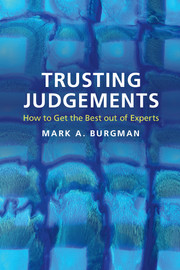5 - The wisdom of crowds revisited
Published online by Cambridge University Press: 05 November 2015
Summary
In the midst of writing this book, a friend from philosophy pointed out that Aristotle argued that the estimates of a large group that includes non-experts should outperform those of an individual expert. Specifically, Aristotle said, ‘[i]t may be argued that experts are better judges than the non-expert; but this objection may be met by reference to (a) the combination of qualities in the assembled people (which makes them collectively better judges than the expert), and (b) the fact that in some cases laymen are in as good a position to judge as experts. … when there are many, each has his share of goodness and practical wisdom; and, when all meet together, the people may thus become something like a single person, who … may also have many qualities of character and intelligence’. This view is surprisingly close to the wisdom that emerged from the last 100 years of experiments and observations on group behaviour and expert judgement.
Mathematician Francis Galton opened a can of worms when he wrote a short paper in 1907 entitled Vox populi. He described a weight-judging competition held at the West of England Fat Stock and Poultry Exhibition. An unfortunate ox was selected. Competitors bought stamped and numbered cards for 6 pence each, on which they wrote what the ox would weigh once it had been slaughtered and ‘dressed’. About 800 cards were sold.
Galton, pre-empting subsequent research into the psychology of motivational biases in expert judgements, noted: ‘[t]he judgements were unbiased by passion and uninfluenced by oratory…the six penny fee deterred practical joking and the hope of a prize and the joy of competition prompted each competitor to do his best’.
Regarding expertise, he observed, ‘[t]he competitors included butchers and farmers, some of whom were highly expert in judging the weight of cattle; others were probably guided by such information as they might pick up, and by their own fancies. The average competitor was probably as well fitted for making a just estimate of the dressed weight of the ox, as the average voter is of judging the merits of most political issues… ’.
- Type
- Chapter
- Information
- Trusting JudgementsHow to Get the Best out of Experts, pp. 116 - 140Publisher: Cambridge University PressPrint publication year: 2015



